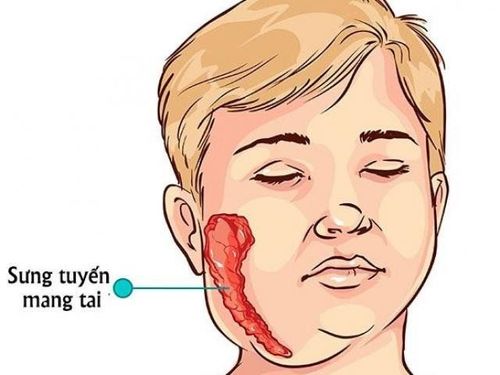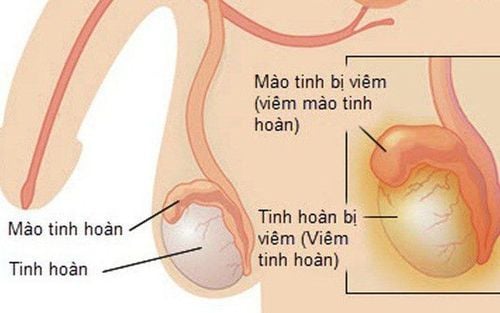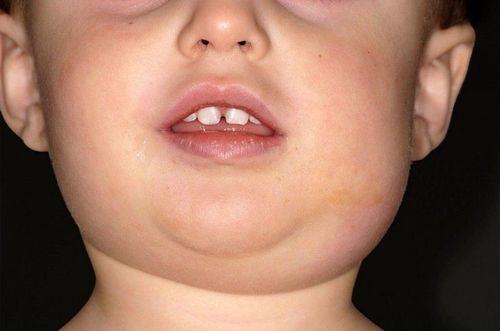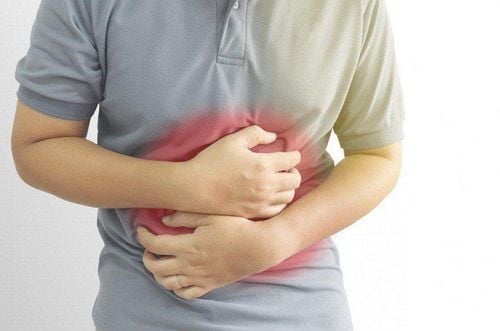This is an automatically translated article.
The article is expertly consulted by Master. Doctor Nguyen Thi Nhat - Doctor of Infectious Diseases - Department of Examination & Internal Medicine - Vinmec Hai Phong International General Hospital. The doctor has more than 10 years of experience in the field of artificial kidneys, and in the field of infectious diseases, examining and managing patients with kidney disease and infectious diseases.Mumps is a fairly common disease in Vietnam. The disease is common in young children and manifests as an infection of the salivary glands. Mumps can carry the risk of serious complications if not treated properly and promptly.
1. What is mumps?
Mumps (eczema) is contagious but benign. The disease is caused by a virus called paramyxovirus, which causes painful swelling of the salivary glands. The disease can be spread through the respiratory tract. Subjects susceptible to mumps are young children, but adults should also pay attention, not belittled.If not treated in time, mumps can cause gonadal inflammation, meningitis, pancreatitis and a number of other complications. Most children and adolescents in Vietnam have had this disease. The winter-spring period is the most likely time for mumps outbreaks.
For children, the healing time of mumps is from 10-12 days, the disease usually goes away on its own. For pregnant women, having mumps can be dangerous, especially in the first 12 weeks of pregnancy, the risk of miscarriage is quite high.
2. Signs of mumps
The early stage of mumps, which is about 14-24 days of incubation, usually does not have any clinical symptoms.When transitioning to the onset of illness, the patient will have signs such as:
The body is weak, eating poorly; Irritability, headache, fatigue; Fever is quite high, lasts about 3-4 days; Salivation and swelling of the salivary glands near the parotid area, followed by swelling of the cheeks (one or both sides); Swallowing pain, pain in the corner of the jaw; Testicular pain, swelling of the scrotum Sore throat; Fear of wind, fear of light.

3. Complications of mumps
Mumps is a contagious but benign disease. The disease causes few serious complications, and even when complications do occur, they can be cured and are rarely life-threatening.The most common complication is meningitis with symptoms of headache, vomiting, fatigue... The patient feels stiff neck, difficult to bend down.
Some other complications of mumps include:
Encephalitis; Orchitis and epididymitis with manifestations such as high fever, chills, vomiting, abdominal pain, pain and stiffness in the testicles, testicle swelling, red scrotum skin. This complication can cause male infertility ; Acute pancreatitis: This complication often has a benign course, with manifestations such as high fever, vomiting... Ovarian inflammation: This complication rarely occurs with abdominal pain. This case must be determined by ultrasound; Some other organs such as lacrimal gland, thymus gland, thyroid gland, mammary gland... may also be affected; Hearing loss in children.

4. How many times can mumps be infected?
Most people only get mumps once in their life. This is a disease with a low chance of recurrence. Often two diseases that are easily confused with mumps are bacterial salivary gland inflammation and salivary gland stones. These are diseases that are easy to recur, obstructing the salivary glands, so it is easy to cause swelling. The disease will recur if the stone remains. Therefore, patients often mistakenly believe that they have recurrent mumps.5. How to prevent mumps?
To prevent mumps , it is necessary to take the following measures:Avoid contact with patients with mumps; When you have mumps, avoid contact and spread it to others; Before taking care of young children, it is necessary to wash and clean hands; Teach your child to cover his or her mouth when coughing or sneezing; For children to be fully vaccinated according to the expanded immunization schedule; At 12-15 months of age, give 3-in-1 vaccine and repeat dose 2 when the child is 4-6 years old. Adults inject 1 single dose; Should drink a lot of water; Do not share personal items with someone who is sick. Mumps is an infectious disease that can affect people of all ages. Although the disease is benign, there can also be a risk of serious complications if not treated in time, so patients need to pay attention to the signs of the disease to take early measures. In addition, it is necessary to actively vaccinate against mumps to protect the health of yourself and your family.
Please dial HOTLINE for more information or register for an appointment HERE. Download MyVinmec app to make appointments faster and to manage your bookings easily.














